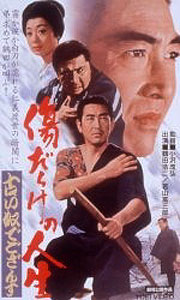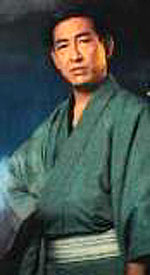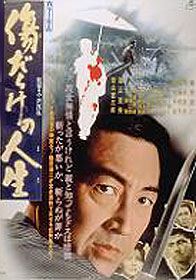 Prostitution together with illegal gambling has been the central money-maker for yakuza activities throughout their existence. Even today they run prostitution rings in Korea & the most above-board-seeming travel agency in Japan is apt to have yakuza connections, as two governments unofficially endorse such activity.
Prostitution together with illegal gambling has been the central money-maker for yakuza activities throughout their existence. Even today they run prostitution rings in Korea & the most above-board-seeming travel agency in Japan is apt to have yakuza connections, as two governments unofficially endorse such activity.
Shigehiro Ozawa's Blood Will Tell (Furui yatsude gonzansu: Kizudarake no jinsei, Toei, 1971) presents vile yakuza of 1931 kidnapping & selling Japanese girls to the military, who prostitute them to Japanese soldiers in Manchuria.
This was a catastrophic & totally historical event which Shohei Imamura looked at most seriously in The Making of a Prostitute (Karayuki-san, 1975). But there is no room for Imamura's honesty in a traditional "chivalrous yakuza" film.
In Blood will Tell, it is not the fate of the women we are asked to be concerned about. Rather, we are to worry about the fate of the hero's brother, who has become the bad guy's henchman.
The gang's evil actions are thus embodied in a character we hope will not be punished or defeated, but who will become a good brother. In the film's morally skewed viewpoint, he wouldn't even have to correct any wrongs or crimes he may have committed as long as brotherly affection is confessed & restored.
 The Ishi gang keeps raiding the Fuji gang to get their whores for the military. A third gang, the Dai, try to intervene before an all-out gang war results, because as we are led to believe by chivalraous gambler films, yakuza can be pimps & still very honorable gents. The Ishi gang keeps raiding the Fuji gang to get their whores for the military. A third gang, the Dai, try to intervene before an all-out gang war results, because as we are led to believe by chivalraous gambler films, yakuza can be pimps & still very honorable gents.
The chief henchman of the Ishis is Ryu Onishi (Tomisaburo Wakayama). The man who keeps trying to intervene is Ei Onishi (Koji Tsuruta), Ryu's brother. Alhough in yakuza-world terms "brother" needn't mean literal brothers, but sworn brothers, in this case they are actual brothers by blood.
The set-up is orchestrated to lead the viewer into the belief that Ryu's villainous actions will force the "good" yakuza Ei to confront his own brother. But in the end Ei actually comes to his brother's rescue. Oh, happy!
Ei's help is needed because, after Ryu obediently performed all the villainous acts demanded by his oyabun (godfather), he is betrayed due to his oyabun's fear of the military & the politicians, who in this scenario are much worse than yakuza, because yakuza don't do anything worse than killing each other & forcing women into sexual slavery for profit.
The climactic fight provides plenty of exciting action, such films all ending in precisely this manner. The actual offenses against women or society are just window-decoration in ninkyo or chivalry films of this type, & it's the effect on the souls or hearts of the men involved that matter most. Ryu's spirit has been savaged by duty to his oyabun, & Ei's spirit has been upraised by his undiminished brotherly affection.
As for the Japanese women who in real life would never return from Manchuria even if they survived it -- because their shame was too great -- well fuck 'em, they don't matter in the big picture of man's love & man's duty.
That this is what passed for chivalrous character in ninkyo-eiga is one of the big reasons the fad for chivalrous gambler films faded away & sensitive actors like Koji Tsuruta were replaced by insensitive pscyopaths played by the likes of Bunta Sugawara. The new viciousness of yakuza films was truer & more real, admitting that gangsters are losers & madmen, not good chaps attempting to adhere to a code.
copyright © by Paghat the Ratgirl
|

